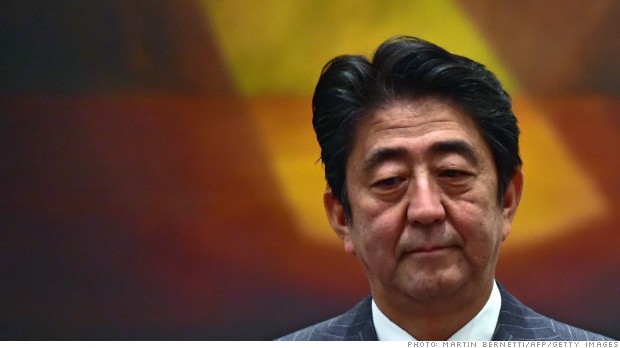 Prime Minister Shinzo Abe must make more progress on structural economic reforms.
Prime Minister Shinzo Abe must make more progress on structural economic reforms. HONG KONG (CNNMoney)
Abenomics -- a massive bond-buying campaign coupled with structural reforms and stimulus from the central government -- has failed to lift wages, bring more women into the workforce or boost exports.
Now, critics are questioning the government's strategy as Prime Minister Shinzo Abe tried to coax the economy back to life after a sales tax hike spurred a massive contraction in the second quarter.
"The economic recovery is not looking good, to be quite blunt," said HSBC economist Izumi Devalier. "Abenomics is at a very difficult point now."
The hope was that coordinated government action would end 15 years of deflation in Japan, and lead to more robust growth for the world's third largest economy. But Abe has failed to push through many key structural reforms, and the window for real change is closing quickly.
Related: Women hold key to fixing Japan's economy
One major problem is that the "virtuous cycle" promised by Abenomics supporters has been slow to materialize. The idea was that an increase in sales would boost corporate profits and lead to higher pay for workers, who would then increase spending.
Yet even with significant prodding from the government and record profits, Japanese businesses are not paying higher wages.
Haruhiko Kuroda, the Bank of Japan governor, last week called the puzzle "troublesome," and lamented a lack of mobility in Japan's labor force. Still, he said workers would be able to negotiate higher wages if they could count on sustained inflation.
Others are less optimistic and think the central bank has few good options to ease the pain of workers. As it stands now, wages are static, but inflation encouraged by the central bank is making goods more expensive -- a problematic situation for the millions of Japanese on fixed incomes.
Related: Japan debt tops 1 quadrillion yen
Concerns about the success of Abenomics have also been underscored by a series of boom and bust GDP reports, the most recent of which showed that Japan's economy shrank at an annual rate of 6.8% in the second quarter.
Much of the poor performance was attributed to a sales tax increase that encouraged consumers to make big purchases in the first quarter and close their wallets during the following three months. But Devalier said the report's details suggested the performance was "even worse than the headline number suggested."
With the tax cut now firmly in the rear-view mirror, the third quarter will be crucial. Should Japan's economy contract again and enter a technical correction, the central bank could be forced to increase stimulus.
Japan must also make progress on the final part of Abenomics: structural reforms that require immense political capital to implement.
Abe's government has proposed measures that would make the labor market more flexible, encourage immigration, bring nuclear power plants back online and draw more Japanese women into the workforce.
Most of those ideas have, so far, gone nowhere.
"These structural reforms are not going to happen overnight," Devalier said. "But they are the most important part of Abenomics."
First Published: August 28, 2014: 10:09 PM ET
Anda sedang membaca artikel tentang
Japan's economic revival is in jeopardy
Dengan url
http://bugarasakti.blogspot.com/2014/08/japans-economic-revival-is-in-jeopardy.html
Anda boleh menyebar luaskannya atau mengcopy paste-nya
Japan's economic revival is in jeopardy
namun jangan lupa untuk meletakkan link
Japan's economic revival is in jeopardy
sebagai sumbernya
0 komentar:
Posting Komentar